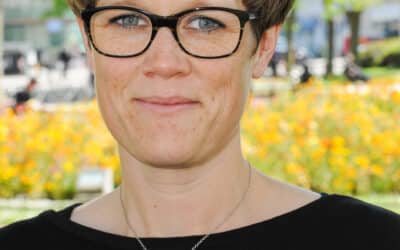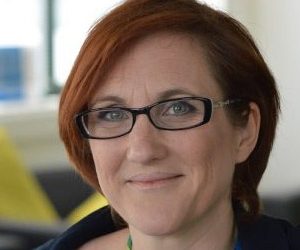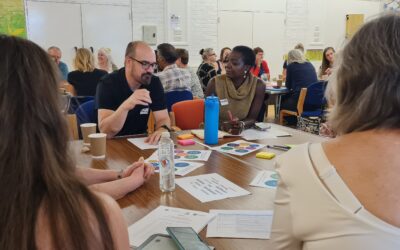A clinical view of the Stroke Health and Wellbeing Service Pilot: From Patient to Person
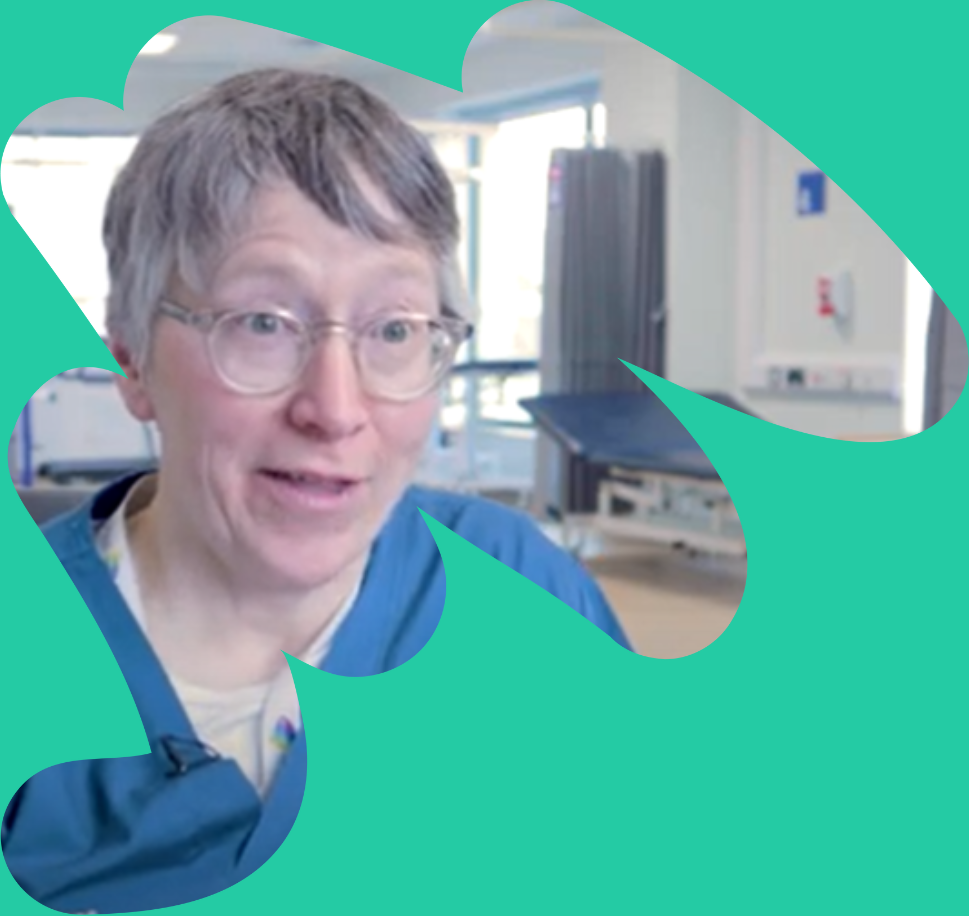
Consultant stroke physician, Dr Ingrid Kane, reflects on provisions for stroke survivors, and how the Stroke and Wellbeing Pilot has improved the lives of patients in Sussex.
If we go back to the first Stroke and Wellbeing Service meeting we had together – which was a long, long time ago in a hall in Brighton, it felt like it was a moment of change actually being at that meeting – because you had so many people from the community, from the hospital, everyone was there explaining how they are part of this system.
In all the time I’ve been doing stroke, I’ve never had the opportunity to be in a room with all those different people who were all involved in the Stroke and Wellbeing Service, and for us all to chat and listen to people and listen to patients, and there are so many people doing so many good things – it’s just not all joined up.
I’m involved in the care of stroke patients from when they come in to the front door, right until they leave the hospital and on into outpatients and following them up in clinic. As a workforce, we’re a big team, we’re a busy team, and we’re all trying to do different things and there’s never enough time. We don’t have enough staff to do all the work that we would like to do and that we should do.
If you speak to anyone at any meeting I go to, the one thing that is always an issue is people having someone that they can contact – that they know – to reduce that feeling of abandonment when they’re discharged from hospital.
To the patients who’ve been involved, it has made such a difference, in the feedback that we’ve had from those patients or relatives, even if it’s a casual comment as they leave hospital.
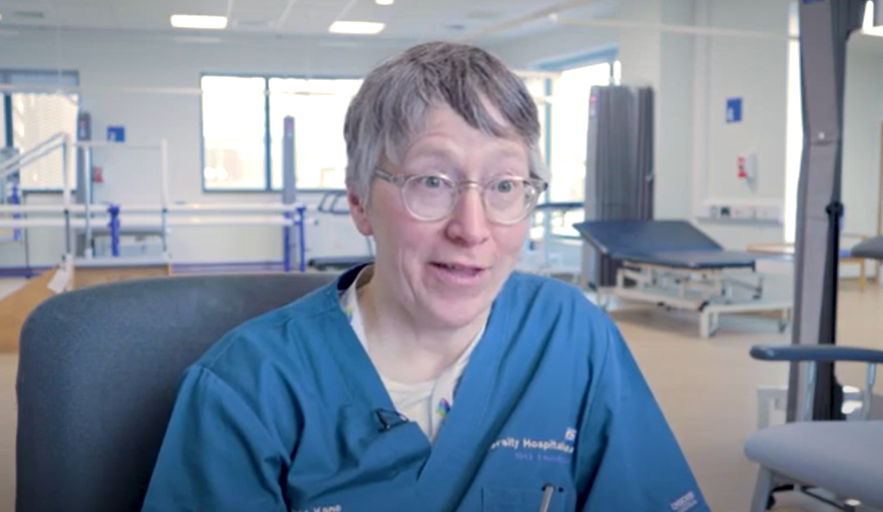
The Stroke and Wellbeing Service has really made an impact and it’s something that I would love to see continued because it’s made such a difference to people.
I think by having these other roles, it means that it frees up a bit of our time to be able to maybe concentrate on other things and let those other conversations that need time. let them happen through a single point of contact. I know when I have the time to spend more time with patients and their relatives, they get a lot out of that – one size doesn’t fit all.
It’s so difficult knowing how, for that individual, they can best navigate the system. And you only get to know that by getting to know people a bit better and having the time with them.
And you might try one thing that doesn’t work, then you move on to something else. If you’ve got the time to do that, that’s what makes all the difference.
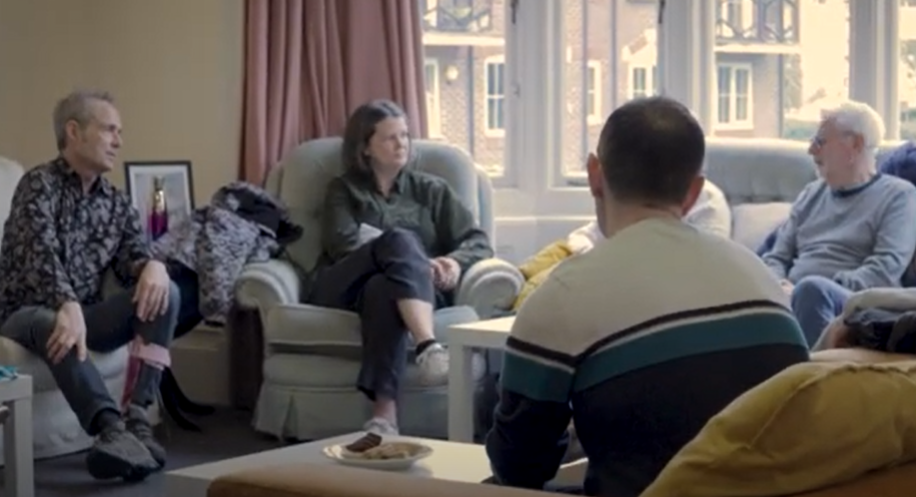
When we get reports of people saying they feel abandoned when they go home, that’s not unique to Sussex, that’s wherever you happen to have your stroke. So I think the people that have been part of the system, the single point of contact with a stroke support worker is important. It can be used anywhere, it can be transferred to anywhere in the stroke system. And similarly, the health builders I think they are so important within the hospital, but also in the community as well.
The stroke pathway doesn’t stop when people leave here. It continues all into the community and it can continue for many months. And that was one of the things that we talked about when we first met is how do we get that true integration from acute into community and how can we get it to continue. Health builders, you just need more of them and more of those groups, and that could again apply to anywhere in the country and to any types of community groups, any age. All of these roles could be moved into other systems.
GP and clinical lead for the Memory Assessment Service (MAS), Dr Rachel Duncan, speaks about stroke research and the particular challenges stroke survivors experience.
There isn’t really a proactive offer from primary care to stroke survivors. So really, the ball is in the court of the stroke survivor to contact primary care with a particular problem. But we also know that this can be challenging because of capacity issues and difficulties with access. And you’ve also got a group of people who have cognitive, mood and energy problems, often in that time after they’ve had their stroke.
So all those factors make it a challenge for them, possibly to engage a lot with primary care. We know there’s a gap, we feel that we should somehow be doing more, but we don’t really know what that more looks like or how you could even provide that in the current healthcare arena when everybody is so pressured, and services are struggling to meet the needs.
Looking at what had been done locally, nationally and internationally, I came across a study called the IPCAs study, a really large study that was mostly funded by the National Institute for Health Research and was a collaboration with the University of Cambridge.
Their findings and our findings really mirrored each other. Yes, this is a local issue, but it’s also a national issue. It’s being identified, and what solutions could we find that might meet the needs of the patient and the system in order to rectify any gaps.

Out of those early discussions out of the case studies and the service mapping and identification of any gaps locally, came the idea of a stroke support worker, and the idea that people who’ve had lived experience have got so much to offer somebody who’s going through this sudden new diagnosis. A solution that isn’t completely clinically focused, but that meets those needs, to me, would make a lot of sense from a health economic point of view.
I’ve seen first-hand what difference it can make to patients coming through the service to have that support element embedded within our clinical team and how personalised and holistic that can be. Having that kind of support service really is of huge benefit to clinicians as well, because it does spare a lot of clinician time.
I think the fact that our local findings and learning really were mirrored by this larger study, the IPCAs study that I mentioned before, I think that’s got to be very powerful to hopefully, in the future, take this forward and have these kind of roles embedded across lots of different chronic illnesses. But I think stroke’s a good place to start.
Also of interest
Rethinking Our Health: starting with pain
We’ve been asking communities what really matters when they’re living with pain. In this update, we share what we heard, what surprised us, and how this learning is shaping a new three-part support offer for MSK pain that starts locally, builds on existing strengths, and is designed together.
Rethinking Our Health: Why it matters
Introducing Rethinking Our Health – a new way of working with communities to support people living with long-term conditions.
Ingredients for community codesign: a venue, some flipcharts, a bowl of soup and a lot of trust
Introducing Rethinking Our Health – a new way of working with communities to support people living with long-term conditions.
